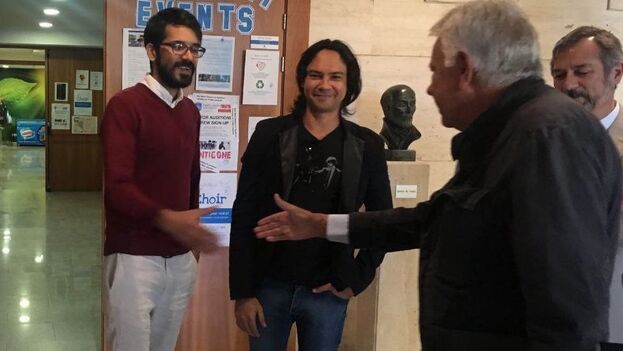
![]() 14ymedio, Frank Calzón, Miami, 22 November 2021 — Yunior García Aguilera, the young Cuban playwright of the Archipiélago Movement, arrived in Madrid on Wednesday, November 17, after the regime mobilized the Army and its police forces from one end of the country to the other to prevent thousands of Cubans from peacefully demonstrating demanding Liberty.
14ymedio, Frank Calzón, Miami, 22 November 2021 — Yunior García Aguilera, the young Cuban playwright of the Archipiélago Movement, arrived in Madrid on Wednesday, November 17, after the regime mobilized the Army and its police forces from one end of the country to the other to prevent thousands of Cubans from peacefully demonstrating demanding Liberty.
A few hours after his arrival in the Spanish capital, some already condemned Yunior García for “having left the country,” when his presence in Europe presents a more serious problem for the Government than his remaining on the island.
Others hurled expletives at him, in a totalitarian Castro way, for criticizing the US embargo, while he denounced the crimes of Castroism and demanded international solidarity for hundreds of young people arbitrarily imprisoned in Cuba.
The Spanish press, which had just reported the suspension in Havana of the accreditation of the correspondents of the EFE press agency, precisely for having interviewed the playwright, published their statements upon arrival. Pablo Casado, an important opposition leader and president of the People’s Party, received him last Thursday, denouncing the Cuban government as “a terrible dictatorship with thousands of murders and political prisoners.”
The following day, the Minister of Foreign Affairs, José Manuel Albares, published a photo of his interview with the young opponent, reiterating “Spain’s commitment to freedom.” This weekend, denunciations of Castroism circulated on the networks by Czech, Dutch, Spanish and Latin American parliamentarians.
The Plaza of the Revolution’s capacity to maneuver continues to deteriorate. A couple of months ago, the European Parliament, with a vote of 426 in favor and 146 against, approved a resolution condemning the repression on the island, and a growing number of Members of the European Parliament (MEPs) are demanding the suspension of cooperation agreements with Cuba, due to the failure to comply with a clause on respect for human rights.
Much progress has been made, I would dare to say that more than is generally recognized in the diaspora and on the island.
Times change and most young people are not interested in Fidel Castro; many despise him, blaming him for the misery of their lives and the national tragedy. Opposition leaders have dismissed the official rhetoric of intimidation and insults to Cubans who think differently.
Today, a minimum of internet access is essential for the functioning of any society. In the case of Cuba, this is key especially for the development of tourism, an economic factor of vital importance given the disappearance of the sugar industry and, likewise, of the gift of Venezuelan oil. It will be impossible for President Díaz-Canel to keep the entire country permanently under media martial law and with a suffocating military presence in the cities and towns of the nation. Protests in Cuba, personal or massive, can no longer be ignored internationally.
The public commitment of the Cuban Church, after decades of caution or complicity, worries Raúl Castro and the leadership, made up mostly of white, obese, stagnant octogenarian military men, veterans of a revolutionary insurrection that today is pure paleohistory for the new generations that now demand a change towards a life in truth.
Yunior García insists that he not be called the leader of the Archipiélago Movement, suggests that the United States tighten against the regime without causing pain to the Cuban people, and opposes, as many have done, the so-called “pressure cooker” doctrine, which has never been the foundation of Washington policy. If so, there would not be two million Cuban-Americans, nor would the exile remittances alleviate the hunger of thousands of families.
Joe Biden is right: the US must provide free internet to Cubans, and “the oppressors,” as the American president describes those who misgovern in Cuba, should give their families the dollars in remittances that are sent in dollars from the United States. Biden has made concessions to tourists to enjoy our beaches and must not do more until there are serious changes in Cuba.
The future is today, no matter how criminally the commanders of the past strive to deny the undeniable: that Cuba is finally opening up to Cubans themselves. And that Cubans have a date with freedom.
____________
COLLABORATE WITH OUR WORK: The 14ymedio team is committed to practicing serious journalism that reflects Cuba’s reality in all its depth. Thank you for joining us on this long journey. We invite you to continue supporting us by becoming a member of 14ymedio now. Together we can continue transforming journalism in Cuba.
